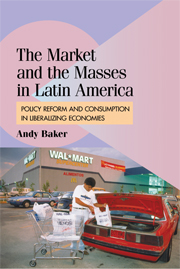Book contents
- Frontmatter
- Contents
- Figures and Tables
- Acknowledgments
- The Market and the Masses in Latin America
- Part I Introduction and Theory
- 1 CONSUMING THE WASHINGTON CONSENSUS
- 2 THEORETICAL FRAMEWORK: THE TOP-DOWN AND BOTTOM-UP SOURCES OF PUBLIC OPINION
- Part II Mass Beliefs about Market Policies in Latin America
- Part III Mass Support for Reform in Brazil
- Part IV Conclusion
- Survey Data Appendix
- References
- Index
- Titles in the series
2 - THEORETICAL FRAMEWORK: THE TOP-DOWN AND BOTTOM-UP SOURCES OF PUBLIC OPINION
Published online by Cambridge University Press: 22 August 2009
- Frontmatter
- Contents
- Figures and Tables
- Acknowledgments
- The Market and the Masses in Latin America
- Part I Introduction and Theory
- 1 CONSUMING THE WASHINGTON CONSENSUS
- 2 THEORETICAL FRAMEWORK: THE TOP-DOWN AND BOTTOM-UP SOURCES OF PUBLIC OPINION
- Part II Mass Beliefs about Market Policies in Latin America
- Part III Mass Support for Reform in Brazil
- Part IV Conclusion
- Survey Data Appendix
- References
- Index
- Titles in the series
Summary
Who knew shopping would turn out to be so important?
– Charles Fishman in The Wal-Mart Effect (Fishman 2006)… [T]he rupture between producer and consumer has become nearly complete.
– Arnold J. Bauer in Goods, Power, History (Bauer 2001, 7)What explains Latin Americans' beliefs about market liberalization? The extraordinary economic policy changes that have occurred since the early 1980s have been drastic enough to have exerted noticeable material impacts on citizens' everyday lives. Among other changes, jobs have disappeared, prices have changed, new transfer-payment programs have been created, and state-funded benefits have been taken away. Because the consequences of economic policies have so obviously “hit people over the head,” I claim that citizens have formulated policy beliefs partially out of economic self-interest. Amid these turbulent and obvious economic shifts, however, politicking has persisted. Politicians have continued to sell themselves and their preferred policies, making promises and other rhetorical attempts to sway voters' opinions about the new market economics. Moreover, many citizens have clung to long-standing political affinities that bias their perceptions of elite discourse and objective economic consequences. In other words, political predispositions and politicians' rhetoric have colored voters' self-interested calculus of the region's drastic economic policy transformation.
This chapter develops a theoretical framework that incorporates elements of both economic self-interest, the basis of bottom-up influences on public opinion, and elite persuasion, also referred to as top-down influences. First, I argue that scholars of Latin America have miscast the nature of citizens' self-interest.
- Type
- Chapter
- Information
- The Market and the Masses in Latin AmericaPolicy Reform and Consumption in Liberalizing Economies, pp. 19 - 56Publisher: Cambridge University PressPrint publication year: 2009



